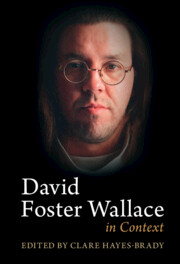Book contents
- David Foster Wallace in Context
- David Foster Wallace in Context
- Copyright page
- Contents
- Figures
- Contributors
- Acknowledgments
- Abbreviations
- Introduction
- Part I Contexts
- Part II Ideas
- Chapter 10 David Foster Wallace and Attention
- Chapter 11 After Analysis
- Chapter 12 Perfectionism and the Ethics of Failure
- Chapter 13 The Pragmatist Possibility in David Foster Wallace’s Writings
- Chapter 14 A Tale of Two Theses
- Chapter 15 Free Will and Determinism
- Chapter 16 David Foster Wallace’s Mathematics of the Infinite
- Chapter 17 David Foster Wallace and Existentialism
- Chapter 18 David Foster Wallace and Religion
- Chapter 19 Mr. Consciousness
- Part III Bodies
- Part IV Systems
- Works by David Foster Wallace
- Bibliography of Secondary Sources
- Index
Chapter 15 - Free Will and Determinism
from Part II - Ideas
Published online by Cambridge University Press: 18 November 2022
- David Foster Wallace in Context
- David Foster Wallace in Context
- Copyright page
- Contents
- Figures
- Contributors
- Acknowledgments
- Abbreviations
- Introduction
- Part I Contexts
- Part II Ideas
- Chapter 10 David Foster Wallace and Attention
- Chapter 11 After Analysis
- Chapter 12 Perfectionism and the Ethics of Failure
- Chapter 13 The Pragmatist Possibility in David Foster Wallace’s Writings
- Chapter 14 A Tale of Two Theses
- Chapter 15 Free Will and Determinism
- Chapter 16 David Foster Wallace’s Mathematics of the Infinite
- Chapter 17 David Foster Wallace and Existentialism
- Chapter 18 David Foster Wallace and Religion
- Chapter 19 Mr. Consciousness
- Part III Bodies
- Part IV Systems
- Works by David Foster Wallace
- Bibliography of Secondary Sources
- Index
Summary
Wallace’s reputation as an author naturally outstrips his renown as a philosopher, but Wallace himself wrote that he saw philosophy and fiction as different arms of a single gesture. Among the strains of philosophy with which he dealt directly was determinism. Indeed, his undergraduate philosophy thesis on this subject was published as a stand-alone text in 2010, under the title Fate, Time and Language. This chapter introduces the concepts with which Wallace grapples in this work, as well as tracing the structural persistence of the theme of determinism through his writing. The chapter also argues that Wallace was an accomplished technical philosopher in his own right, but that the strict form of philosophical writing did not lend itself to his tendency toward literal illustrations of complex concepts. In this respect, the chapter argues for Wallace as a literary philosopher in the vein of Wallace Stevens, seeing the creative work as a form of philosophy in itself.
- Type
- Chapter
- Information
- David Foster Wallace in Context , pp. 159 - 168Publisher: Cambridge University PressPrint publication year: 2022

